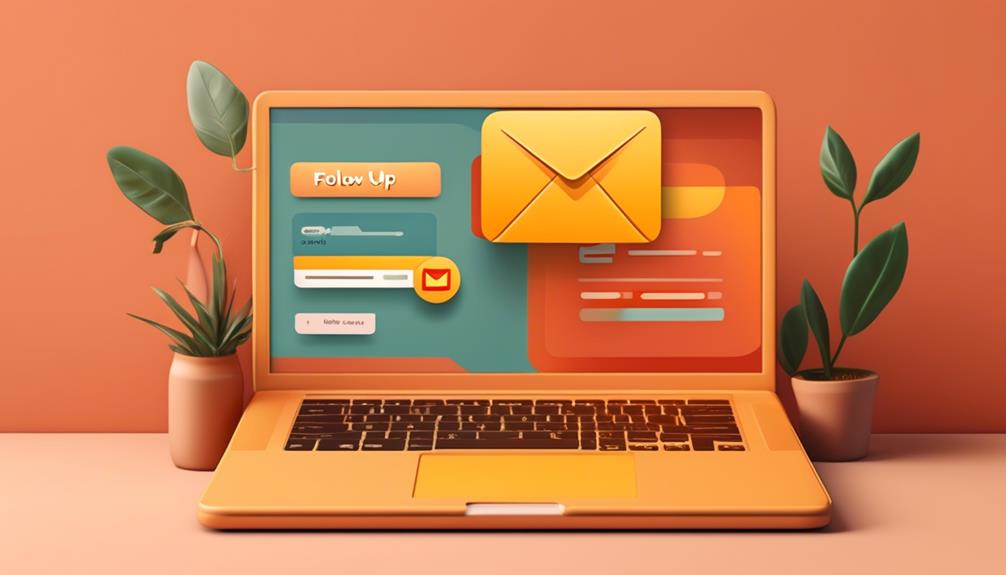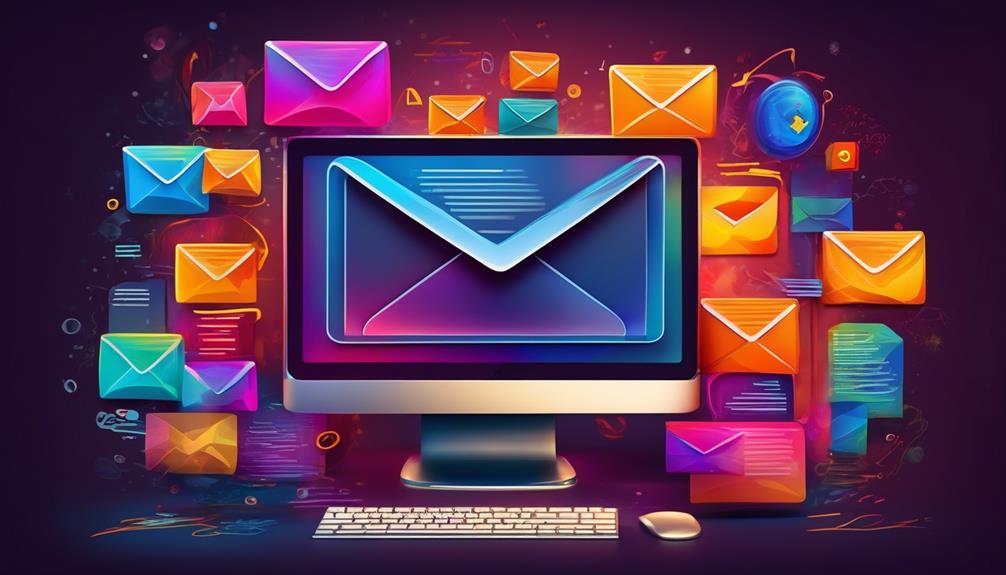Starting the process of warming up an email address is like laying the foundation for a sturdy building – a crucial step that sets the tone for the entire structure.
With the ever-evolving landscape of email deliverability, it's imperative to understand the nuances of warming up an email address to ensure optimal engagement and deliverability.
But how exactly does one go about this process? What are the best practices to follow, and what pitfalls should we avoid?
Let's explore the intricacies of warming up an email address and unravel the key strategies that pave the way for a successful email campaign.
Key Takeaways
- Gradually increase email volume to build trust and avoid being flagged as spam
- Establish a reputable domain to improve email deliverability rates and engagement
- Actively engage in conversations and reply to emails to establish credibility
- Utilize automated tools and services for consistent engagement and higher delivery rates
What Is Email Warm-Up?
Exploring the process of gradually increasing email volume from a new email account, known as email warm-up, is crucial for establishing a positive sender reputation. When we warm up our email, we're essentially taking steps to build trust with email service providers and recipients.
This process is especially significant when sending cold emails, as it helps in avoiding the dreaded spam folder. As we warm up our email, we're essentially proving to the email service provider that we're a legitimate sender and not a spammer. This is vital because a poor sender reputation can greatly impact the deliverability of our emails.
Furthermore, warming up a new email account involves establishing a reputable domain and ensuring that our emails are reaching the intended recipients' inboxes. By gradually increasing our email volume and engaging in genuine interactions, we can effectively warm up our email and lay the foundation for successful outreach campaigns.
Therefore, understanding the importance of email warm-up and implementing best practices is essential for anyone looking to establish a positive sender reputation.
Importance of Email Warm-Up

Establishing a positive sender reputation through email warm-up is vital for ensuring successful outreach campaigns and achieving higher deliverability rates. By gradually increasing sending volume and engaging in warm-up emails, a new email account can build trust with inbox providers and avoid being flagged as spam. This process is crucial for enhancing deliverability and ensuring that personalized emails land in the recipient's inbox rather than getting filtered out. A well-warmed domain is more likely to have its emails delivered and opened, contributing to improved engagement and relationship building. The table below outlines the importance of email warm-up in achieving these goals:
| Benefits of Email Warm-Up | |
|---|---|
| Enhanced Sender Reputation | Higher Email Deliverability |
| Improved Engagement Rates | Avoidance of Spam Filters |
Manual Email Warm-Up Process
Let's talk about the manual email warm-up process and the essential steps for effective outreach strategies.
We'll cover the key points to consider when manually warming up email addresses and how to ensure a successful engagement with the inbox.
From establishing credibility through authentication to gradually increasing email volume, we'll discuss the best practices for manually warming up email accounts.
Email Warm-Up Steps
Engaging in genuine interactions and gradually increasing email volume are essential steps in the manual email warm-up process.
When warming up your email account, it's crucial to start with a small number of emails per day and gradually increase the sending volume. This approach helps to establish your email account's reputation and prevents it from being labeled as spam.
Additionally, actively engaging in conversations and replying to emails from the new account demonstrates genuine usage, further contributing to the warm-up process.
It's important to make sure that the emails you send are authentic and relevant to the recipients.
Effective Outreach Strategies
When initiating the manual email warm-up process, it's crucial to employ effective outreach strategies to build trust and credibility with your contacts. To ensure successful warming up of email addresses, personalized outreach and positive sender reputation are essential. Here are some effective outreach strategies to consider:
| Outreach Strategies | Benefits | Implementation |
|---|---|---|
| Personalized Outreach | Establishes rapport with recipients | Craft tailored messages addressing recipient's needs |
| Digital Signature | Enhances credibility | Add a professional digital signature to emails |
| Mailbox Activity | Demonstrates genuine engagement | Regularly interact with the inbox by sending and replying to emails |
Automated Email Warm-Up Process

We've been exploring the importance of warming up email addresses, and now it's time to talk about the automated process.
Utilizing automated tools and services for email warm-up not only saves time and effort but also ensures a consistent engagement strategy.
Email Warm-Up Tools
Automated email warm-up tools gradually increase email volume to establish a positive sender reputation, saving time and effort while ensuring consistent engagement and efficient results. When utilizing these tools, it's essential to consider proper warm-up techniques and the gradual increase of email sending quota.
Additionally, verifying SPF and DKIM records is crucial for a higher delivery rate. Subsequently, automated email warm-up tools can also facilitate cold email outreach by simulating real user behavior.
Furthermore, conducting an automated test campaign through these tools can help in assessing and improving engagement metrics, ultimately enhancing the overall sender reputation.
Some popular automated email warm-up tools with advanced features include Trulyinbox, Warmy.io, and Mailwarm, which are recommended for improving email deliverability and sender reputation.
Best Practices
To enhance email deliverability and sender reputation, implementing best practices in the automated email warm-up process is essential.
When warming up a new domain, it's crucial to start with a low volume of emails and gradually increase the daily sending limits. This helps in establishing a positive reputation with the email provider and avoids triggering any alarms.
Sending cold emails should be avoided during the warm-up phase to prevent any negative impact on the IP address.
Additionally, personalized emails with limited links and media files contribute to a successful warm-up process.
Choosing a reputable email service provider and utilizing automated tools such as Trulyinbox, Warmy.io, and Mailwarm can further aid in achieving a smooth and effective warm-up for the email address.
Criteria for Stopping Email Warm-Up

The completion of the warm-up process for email addresses can be determined by tracking open rates, click-through rates, and bounce rates. Once the open rates and click-through rates indicate that the emails are being engaged with, and the bounce rates are low, it's a good sign that the email account is properly warmed up.
Additionally, monitoring the sender reputation using Email Warm-Up tools is crucial, and if the reputation remains consistently good, it's an indication that the warm-up process can be stopped.
- Low bounce rate indicates a warmed-up email account and good deliverability.
- This suggests that the emails are being delivered successfully and not bouncing back, indicating that the email account is ready for regular use.
- Consider stopping warm-up process after 2-4 weeks of gradual increase in daily email count.
- Gradually increasing the number of emails sent over a period of time helps to establish the email account before sending a large volume of emails.
Factors Affecting Email Warm-Up

Factors affecting email warm-up include:
- The reputation of the new email account
- The gradual increase in email sending volume
- Active engagement with the inbox
- Domain reputation
- The quality and consistency of email content
When warming up an email address, it's essential to consider the reputation of the new account. New email accounts typically have limited sending limits and need to build a positive reputation over time.
Gradually increasing the volume of sent emails is crucial for successful warm-up as well. This gradual increase demonstrates to the email provider that the account is being used responsibly and can help avoid being flagged for suspicious activity.
Active engagement with the inbox, such as responding to emails and maintaining a healthy open rate, is key to establishing a positive sender reputation during warm-up.
Additionally, building a good domain reputation takes time and can significantly impact the warm-up process.
Lastly, crafting genuine, engaging emails with limited links and media files, and maintaining consistent mailing habits are essential factors for successful warm-up. Personalized outreach can also positively influence the warm-up process by fostering genuine connections with recipients.
Benefits of Email Warm-Up Tools

Utilizing email warm-up tools can significantly improve the sender reputation and deliverability of email accounts. The benefits of these tools include:
- Enhanced Sender Reputation and Deliverability
- By gradually increasing email volume and ensuring consistent engagement, warm-up tools help in establishing a good sender reputation and avoiding being flagged as spam.
- Higher open rates can be achieved, as email service providers recognize the gradual warm-up process as a sign of authentic and personalized email sending rather than mass sending cold emails.
- Optimized Utilization of Email Account
- These tools enable users to start using a new email address for sending mass or personalized emails, ensuring full utilization of the account's sending limit before sending cold emails.
Frequently Asked Questions
How Do I Warm up My Email Address?
We warm up email addresses gradually to build reputation and avoid being marked as spam.
We start with a small number of emails and authenticate our account through SPF, DKIM, DMARC, and custom domain.
Using manual methods like sending individual emails, subscribing to newsletters, and maintaining conversation threads helps.
We also consider automating the process using tools to gradually increase email volume.
Following best practices like writing genuine emails and limiting links is crucial.
How Long Does It Take to Warm up an Email Address Instantly?
Instantly warming up an email address isn't feasible. It typically takes a few days to several weeks, based on the email provider. It's a gradual process to establish a good sender reputation and ensure high delivery rates.
A well-executed warm-up builds trust and enhances inbox placement during cold email outreach. Automated tools or services can streamline and optimize this vital process for efficient and effective results.
How Can I Warm up My Email Domain for Free?
We can warm up our email domain for free by starting with a new email account and gradually increasing the volume of outgoing emails.
It's important to configure the email account with SPF, DKIM, and DMARC records to improve deliverability.
Additionally, engaging in conversations with influencers, subscribing to newsletters, and purchasing older domains can facilitate the warm-up process.
These manual methods will help establish a positive reputation for our email domain.
How Do I Warm up My Domain for Cold Email?
We warm up our domain for cold email by gradually increasing our email volume and establishing a good sender reputation.
We authenticate our account through SPF, DKIM, DMARC, and a custom domain to improve deliverability.
Additionally, we engage with friends and colleagues through individual emails and subscribe to newsletters to increase engagement.
We also consider using automated warm-up tools or services to ensure consistent engagement and monitor deliverability and engagement metrics for successful results.
What are the steps to warm up an email address?
To warm up an email address, start by sending a small number of emails to engaged recipients. Gradually increase the volume and frequency over a few weeks. Be sure to monitor email engagement and adjust your strategy accordingly. This is how to warm up email addresses effectively.
Can Warming Up an Email Account Help Prevent Cold Emails from Being Flagged as Spam?
Warming up email accounts is a crucial step in preventing cold emails from being flagged as spam. By gradually increasing the volume of emails sent, engaging with recipients, and maintaining a healthy sender reputation, you can establish trust with email providers and reduce the risk of your messages being filtered.
Conclusion
As we embark on the journey of warming up our email address, let's remember that it's like tending to a delicate garden. By nurturing it slowly and steadily, we can cultivate a strong and reputable presence in the digital world.
Just as a garden needs time to flourish, our email address needs time to establish credibility and trust. With patience and the right tools, we can watch our efforts bloom into successful communication.









